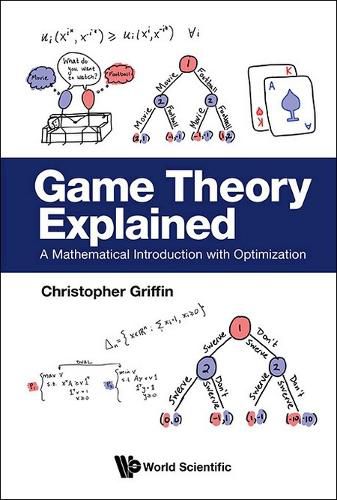Readings Newsletter
Become a Readings Member to make your shopping experience even easier.
Sign in or sign up for free!
You’re not far away from qualifying for FREE standard shipping within Australia
You’ve qualified for FREE standard shipping within Australia
The cart is loading…






This title is printed to order. This book may have been self-published. If so, we cannot guarantee the quality of the content. In the main most books will have gone through the editing process however some may not. We therefore suggest that you be aware of this before ordering this book. If in doubt check either the author or publisher’s details as we are unable to accept any returns unless they are faulty. Please contact us if you have any questions.
This book provides an introduction to the mathematical theory of games using both classical methods and optimization theory. Employing a theorem-proof-example approach, the book emphasizes not only results in game theory, but also how to prove them.Part 1 of the book focuses on classical results in games, beginning with an introduction to probability theory by studying casino games and ending with Nash's proof of the existence of mixed strategy equilibria in general sum games. On the way, utility theory, game trees and the minimax theorem are covered with several examples. Part 2 introduces optimization theory and the Karush-Kuhn-Tucker conditions and illustrates how games can be rephrased as optimization problems, thus allowing Nash equilibria to be computed. Part 3 focuses on cooperative games. In this unique presentation, Nash bargaining is recast as a multi-criteria optimization problem and the results from linear programming and duality are revived to prove the classic Bondareva-Shapley theorem. Two appendices covering prerequisite materials are provided, and a 'bonus' appendix with an introduction to evolutionary games allows an instructor to swap out some classical material for a modern, self-contained discussion of the replicator dynamics, the author's particular area of study.
$9.00 standard shipping within Australia
FREE standard shipping within Australia for orders over $100.00
Express & International shipping calculated at checkout
This title is printed to order. This book may have been self-published. If so, we cannot guarantee the quality of the content. In the main most books will have gone through the editing process however some may not. We therefore suggest that you be aware of this before ordering this book. If in doubt check either the author or publisher’s details as we are unable to accept any returns unless they are faulty. Please contact us if you have any questions.
This book provides an introduction to the mathematical theory of games using both classical methods and optimization theory. Employing a theorem-proof-example approach, the book emphasizes not only results in game theory, but also how to prove them.Part 1 of the book focuses on classical results in games, beginning with an introduction to probability theory by studying casino games and ending with Nash's proof of the existence of mixed strategy equilibria in general sum games. On the way, utility theory, game trees and the minimax theorem are covered with several examples. Part 2 introduces optimization theory and the Karush-Kuhn-Tucker conditions and illustrates how games can be rephrased as optimization problems, thus allowing Nash equilibria to be computed. Part 3 focuses on cooperative games. In this unique presentation, Nash bargaining is recast as a multi-criteria optimization problem and the results from linear programming and duality are revived to prove the classic Bondareva-Shapley theorem. Two appendices covering prerequisite materials are provided, and a 'bonus' appendix with an introduction to evolutionary games allows an instructor to swap out some classical material for a modern, self-contained discussion of the replicator dynamics, the author's particular area of study.